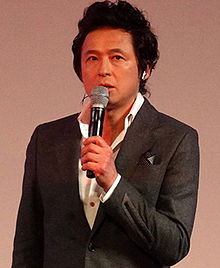Yang Bang-ean
Yang Bang-ean | |
|---|---|
 | |
| Background information | |
| Born | January 1, 1960 Tokyo, Japan |
| Occupation(s) | Composer, arranger, record producer, and pianist |
| Instrument | Piano |
| Website | Official website |
| Yang Bang-ean | |
| Hangul | 양방언 |
|---|---|
| Hanja | |
| Revised Romanization | Yang Bang-eon |
| McCune–Reischauer | Yang Pangŏn |
| Japanese name: Kunihiko Ryō ( | |
Yang Bang-ean (Korean: 양방언; Hanja:
Early life and beginnings
[edit]This section may need to be rewritten to comply with Wikipedia's quality standards. (May 2012) |
Yang Bang-ean was born in Tokyo, Japan as a youngest son of five children from a Zainichi Korean family. His late father (born in Jeju-do, South Korea), worked as a doctor; his mother (born in Sinuiju, North Korea)[1] worked as a nutritionist at a hospital her husband owned. Yang started his early education at the Chōsen School (
Personal life
[edit]His father named him Yang Bang-ean (양방언,
Yang Bang-ean had been living with his nationality of North Korea over 30 years. However, he had to give up his citizenship to North Korean in 1999 as it was difficult to work overseas while holding a North Korean citizenship.[citation needed]
Yang Bang-ean first met his wife at a party she was throwing. He married her when he was in his mid-thirties after being in a relationship for approximately 10 years. He currently lives in Karuizawa, Nagano in order to relax from the busy city life and concentrate on music.[citation needed]
Discography
[edit]- (1988–1989) Arranged the music for one of the closing themes of Dennou Keisatsu Cybercop.
- (1991) Soundtrack to NTV TV-drama "Aisazu ni iranai" starring Eisaku Yoshida.
- (1992) Co-produced the album Continue the Revolution.
- (1995) Did the theme song and other music for the Jackie Chan film Thunderbolt (also known as Dead Heat).[3]
- (October 1995) Produces the theme song Everlasting Truth for TBS TV program Mireba nattoku!.
- (1995) The theme music for Fist of Fury.[3]
- (July 28, 1997) Releases his debut album The Gate of Dreams.
- (September 18, 1997) Releases single, Wings of Mirage, it used as the theme song of the TV Asahi show Super Morning.
- (1998) Released the second official album Into The Light.
- (November 19, 1999) Released the third official album Only Heaven Knows.
- (May 16, 2001) Released the fourth official album Pan-O-Rama.
- (2002) Released the OST album of The Twelve Kingdoms.
- (May 27, 2002) Released the piano solo album Piano sketch.
- (May 14, 2004) Released the fifth official album Echoes.
- (2004–2005) Arranged the ending theme of Fantastic Children.
- (October 28, 2005) Released the OST album of Emma - A Victorian Romance.
- (July 24, 2006) Released the OST album of a KBS documentary KBS 스페셜 도자기.
- (2006-2007) Composed the Original Soundtrack and the opening for the TV anime series The Story of Saiunkoku.
- (January 17, 2007) Took part in the OST album of Yobi, the Five Tailed Fox.
- (March 29, 2007) He composed the music for the live action film Beyond the Years,[4]
- (August 16, 2007) Released the OST album of Emma - A Victorian Romance: Second Act.
- (November 16, 2007) Released the OST album of a KBS documentary KBS 스페셜 차마고도.
- (October 21, 2008) Released the official Aion: The Tower of Eternity original soundtrack featuring 22 tracks. The soundtrack was released on iTunes on October 20, 2009.[5]
- (October 19, 2009) Released the sixth official album Timeless Story.
- (2009–2011) Composed the music for the anime series Tegami Bachi.
- (2011) Composed the music for the anime series Level E.
- (November 10, 2011) Released the first special album Floating Circle.
- (October 16, 2013) Released the OST album of the MMORPG ASTA.
- (2014-2015) Composed the Original Soundtrack and the opening for the TV anime series Yona of the Dawn.
- (December 17, 2015) Released the Seventh official Album Embrace
- (October 12, 2016) Released the Best Album The Best
- (October 27, 2017) Composed the Olympic games is Echos For Pyeongchang
- (August 5, 2021) Released the Dark Ark OST album
- (November 30, 2021) Released The Live Special album is Light and Shadow
- (November 20, 2022) Released the New Single is Neo Utopia
References
[edit]- ^ a b Lee, Min-a (November 8, 2006). "Ethnic Korean to compose new tourism song". Korea JoongAng Daily. JoongAng Ilbo. Retrieved February 11, 2018.
- ^ Gann, Patrick (June 18, 2009). "EXCLUSIVE INTERVIEW WITH RYO KUNIHIKO, REGARDING NCSOFT'S "AION"". OSV. Original Sound Version. Retrieved February 11, 2018.
- ^ a b "Archived copy". Archived from the original on October 7, 2011. Retrieved October 4, 2011.
{{cite web}}: CS1 maint: archived copy as title (link) - ^ Edwards, Russell (October 7, 2007). "Beyond the Years". Variety. Retrieved September 28, 2011.
- ^ "ITunes - Music - AION Original Sound Track by Ryo Kunihiko". iTunes. Archived from the original on November 7, 2012. Retrieved March 1, 2015.
External links
[edit]- Official website (in Japanese)
- Official website (in Korean)
- Yang Bang-ean at Anime News Network's encyclopedia
- Yang Bang-ean at IMDb
